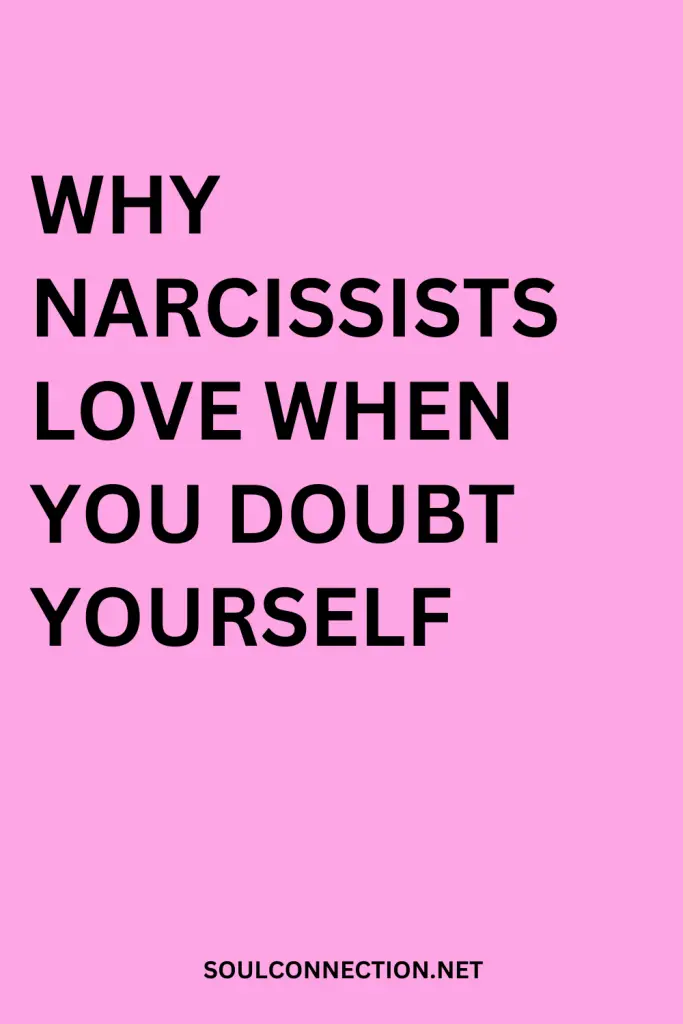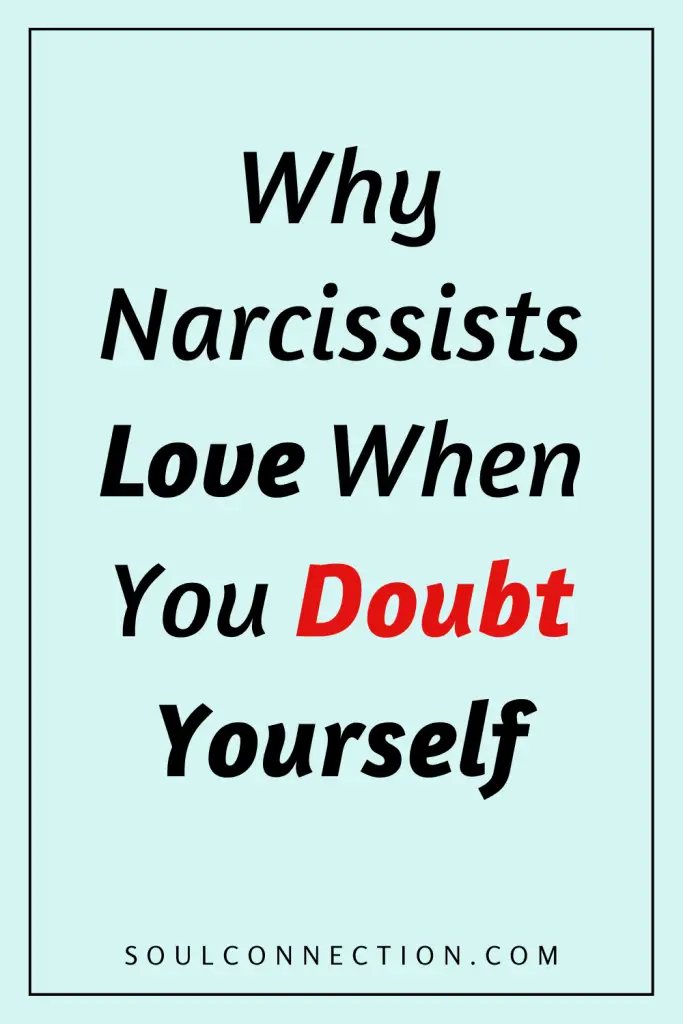Ever noticed how someone with narcissistic tendencies seems to beam just a bit brighter when you’re second-guessing yourself? Yes, you. The one replaying old arguments in the shower.
If you’ve ever felt like your confidence is on a trampoline—up, down, never steady—there’s a reason for that. Narcissists absolutely thrive when your self-assurance starts to wobble. Here’s why.
The Power Play at the Heart of It All
Narcissism isn’t just about loving the mirror a little too much. At its core, it’s all about control and validation. Narcissists crave power over the narrative, the relationship, and—if they can swing it—your very sense of self.
Self-doubt is their secret weapon. A confident, self-possessed partner is a tough nut to crack.
But someone wrestling with uncertainty? That’s low-hanging fruit.
When you hesitate, question your instincts, or apologize for things you haven’t done, a narcissist sees an open door.
Not the polite “after you” sort of door, either—more like a saloon door they can swagger through and start rearranging your reality.
Gaslighting Finds Fertile Ground
Self-doubt is the peanut butter to a narcissist’s gaslighting jelly. The more you question yourself, the easier it is for them to recast history.
Suddenly, what you remember clearly (“Didn’t you say you’d be late?”) becomes foggy and debatable (“You’re always so sensitive—are you sure that’s what I said?”).
Gaslighting can’t really stick if you’re rock solid in your beliefs. But a little insecurity goes a long way.
Questioning your own memory or judgment lets narcissists rewrite the script, and before you know it, you’re the unreliable narrator in your own story.
Feeding Their Ego Buffet
A narcissist’s ego demands constant snacks—admiration, attention, validation. When you doubt yourself, you’re much more likely to hand over compliments and reassurance.
It’s not unusual to hear yourself saying things like, “Maybe I’m overreacting,” or “You’re probably right, I do get too emotional.”
This, for a narcissist, is a buffet. Serve it up, and they’ll come back for seconds.
If they can get you to believe they’re always right, their self-importance balloons. And the more you shrink, the bigger they feel.
Keeping You Off-Balance
Relationships should feel like a two-person canoe—paddling together, mostly in the same direction (unless someone spots a duck). Narcissists prefer their partners a little seasick.
When you’re doubting your own perspective, you’re less likely to challenge them, make demands, or set boundaries. That’s exactly what they want.
If you’re always apologizing, always unsure, you’re too busy spinning on your own axis to notice how much of your power you’ve handed over.
Emotional equilibrium? Not in their interest.
Making You Dependent
Narcissists love to be needed. If you’re doubting yourself, who better to turn to than the self-assured, all-knowing oracle who’s always got an answer? (Hint: it’s them, at least in their mind.)
Bit by bit, you start to rely on their judgment. Whether it’s choosing a restaurant or reinterpreting an argument from three weeks ago, your confidence quietly packs its bags.
Suddenly, you’re looking to them for cues about how to feel.
This dependency gives them more leverage. More influence. More chances to be the sun around which you orbit.
Silencing Your Voice
Speak up? Not if you’re busy second-guessing yourself. Narcissists are masterful at training you to keep your concerns to yourself.
Maybe you start to think, “It’s probably just me,” or “I’m too sensitive.” You hold back, stay quiet, and the relationship becomes a one-way street.
It’s not just about winning arguments—it’s about keeping you quiet enough that their needs are always front and center.
Silence is golden for them. For you, it’s a slow erasure.
Deflecting Responsibility
Narcissists are allergic to blame. If you’re always doubting yourself, guess who never has to say sorry? That’s right—the person who should be apologizing.
Suddenly, every argument circles back to your supposed flaws. “If you weren’t so paranoid…” or “You always make things harder than they need to be.”
It’s not just about dodging accountability—it’s about subtly convincing you that you’re always the problem.
Over time, you shoulder more and more responsibility for the relationship’s troubles, while they get to skate away whistling.
Why It Works So Well
You might be wondering, “Why does this actually work?” It’s surprisingly easy for even confident folks to get caught in this spiral.
Narcissists are skilled at finding your insecurities and prodding them, often in ways that feel subtle at first.
Maybe it’s a joke at your expense, maybe it’s a backhanded compliment, maybe it’s “just being honest.” Over time, all those tiny pinches add up.
We’re all vulnerable to self-doubt. Narcissists just know how to turn it into a full-fledged identity crisis.
Fighting Back with Self-Trust
If you’re reading this and nodding along, take heart: you’re not broken, and you’re definitely not alone. Self-doubt isn’t a flaw; it’s a human feature. The trick is not letting someone else weaponize it against you.
Try this tonight: when a moment of doubt bubbles up, pause before reaching for their reassurance. Ask yourself—what do you really believe? What’s your gut telling you?
Even a whisper of self-trust is worth protecting.
If you catch yourself apologizing for things that aren’t your fault, do a quick inventory. Whose narrative are you believing? Whose reality is running the show?
Setting Boundaries (Yes, It’s Possible)
Boundaries are a narcissist’s least favorite thing—right up there with admitting they’re wrong. But you can draw a line, even if it’s just in the sand at first.
When you start to notice those familiar feelings of “Maybe I’m just being difficult,” treat it as a red flag. Speak up, even if your voice shakes. “That doesn’t feel right to me,” is a full sentence.
You don’t need to win every argument or convince them you’re right. You just need to honor your own experience. That’s more than enough.
Finding Your People
Nobody gets through this alone. Whether it’s a mate who knows the score, a counselor, or even that one aunt who always says it straight, find someone who can help you reality-check.
Share your doubts. Say them out loud. Sometimes the act of voicing them robs them of their power.
And if you need permission to take up space in the relationship? Consider it granted.
The Small Wins Add Up
You won’t banish self-doubt overnight. Even the most self-assured people have their moments (just ask anyone who’s ever sent a risky text and stared at the screen waiting for those three dots to disappear).
Celebrate the tiny victories. Speak a truth, set a boundary, trust yourself even once in the face of pushback. Each one is a brick in the foundation of a self that’s a little harder to topple.
The Confidence Comeback
Narcissists may love when you doubt yourself, but your confidence is not lost forever. It’s waiting in the wings, ready for a comeback tour.
Maybe not with confetti cannons, but with the quiet certainty that you are your own best witness.
Tonight, question the scripts you’ve been handed. If you’re wrong sometimes, that’s called being human.
If someone insists you’re always wrong? That’s called manipulation.
You don’t need anyone’s permission to trust your own mind. Even when it’s hard. Especially when it’s hard.
Keep an eye on your self-doubt—but don’t let anyone else claim it as their playground. Your story deserves to be written by you.


